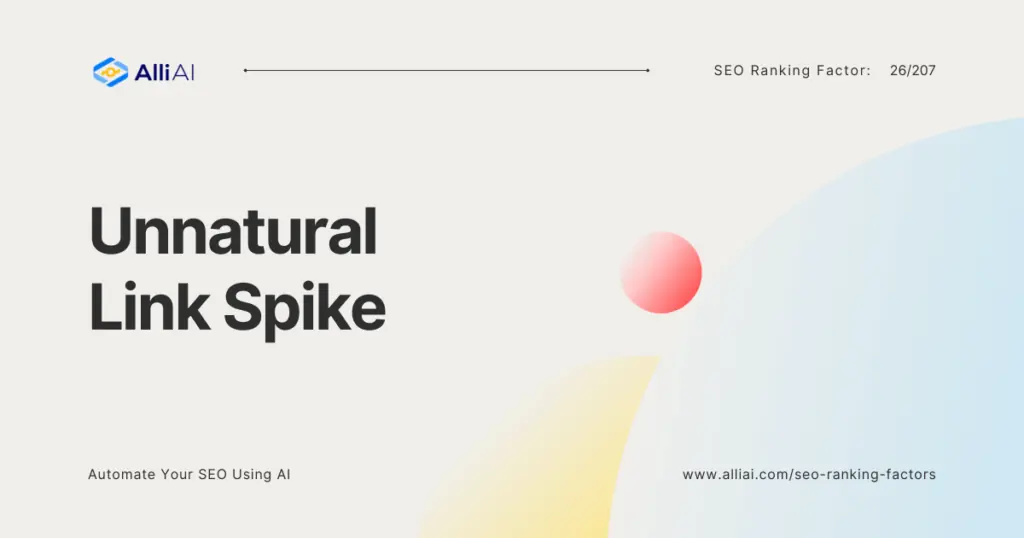Deconstructing Unnatural Link Spike
An unnatural link spike refers to a rapid increase in a website’s backlinks within a compressed timeframe, typically deviating from the site’s established link acquisition pattern. While a few extra links might seem harmless, a sudden influx can signal to search engines that these links were not earned organically, but rather artificially manufactured in an attempt to game the system.
For instance, purchasing links from low-quality directories, participating in excessive link exchanges, or engaging in other black-hat SEO practices can all contribute to unnatural link spikes. Even well-intentioned strategies like aggressive blog commenting or forum posting can backfire if done excessively. It’s crucial to remember that not all link spikes are detrimental. A sudden increase in backlinks due to a viral piece of content, a major PR campaign, or a seasonal trend can be perfectly natural and even beneficial. The key is to differentiate between organic and artificial growth.
Why is an Understanding of Unnatural Link Spike Important in SEO?
In SEO, the quality and quantity of backlinks are crucial factors in determining a website’s ranking. However, search engines like Google have sophisticated algorithms designed to detect unnatural patterns, including link spikes, which can be seen as attempts to manipulate these rankings. An unnatural link spike, therefore, draws scrutiny and can lead to penalties or a drop in ranking, emphasizing the necessity of organic growth in a website’s link profile.
How Unnatural Link Spikes Affect SEO?
Unnatural link spikes can detrimentally affect SEO in several key ways:
Penalties from Search Algorithms: Google’s Penguin update, for example, targets websites that engage in link schemes. Such sites may suffer a sharp decline in search rankings.
Short-lived Ranking Improvements: According to studies by Moz, sites that experience unnatural link spikes often see initial ranking improvements, which quickly deteriorate unless supported by genuine content quality and user engagement.
Reputation Damage: Sudden surges in backlinks from low-quality sources can harm a website’s reputation with both users and search engines.
Navigating the Aftermath: Recovery and Prevention
Recovering from a penalty due to an unnatural link spike can be a daunting task, often involving a thorough backlink audit to identify and disavow harmful links. This process requires meticulous analysis of each backlink, assessing its quality, relevance, and potential risk. Creating and submitting a disavow file to Google can help disclaim any association with toxic backlinks, signaling to the search engine that you are actively working to rectify the issue.
To prevent future occurrences of unnatural link spikes, it’s imperative to focus on white-hat link-building strategies that prioritize quality over quantity. This involves creating high-quality, shareable content, engaging in genuine outreach to relevant websites, and building relationships with industry influencers.
How Can Alli AI Help with Unnatural Link Spikes?
Understanding and mitigating the risks associated with unnatural link spikes is crucial. Here’s how Alli AI can assist:
- Link Pace Analysis: Alli AI analyzes your site’s link-building pace, comparing it to industry standards to identify unnatural spikes.
- Quality Backlink Recommendations: Alli AI also suggests strategies for acquiring high-quality, relevant backlinks that reflect genuine interest and engagement, fostering organic growth.
FAQ
How can I distinguish between natural and unnatural link spikes?
Natural link spikes often correspond with significant events, such as the launch of a new product, a mention by a major publication, or viral content. Unnatural spikes, however, lack such correlating events and consist mostly of low-quality or irrelevant backlinks.
What should I do if I notice an unnatural link spike?
Immediately audit your backlink profile to identify the source of the links. Use tools like Alli AI to help assess the quality of these links and consider disavowing those that could harm your website’s reputation with search engines.
How long does it take for search engines to recognize and penalize unnatural link spikes?
The timeline can vary. Some websites may experience immediate repercussions, while others might not see the effects for several months. Consistent monitoring and maintenance of your link profile are crucial to mitigating any potential damage.
Conclusion
Dealing with unnatural link spikes is a critical aspect of managing your website’s SEO health. While these spikes can temporarily boost your site’s visibility, the long-term consequences can significantly harm your rankings and reputation. By understanding what constitutes an unnatural link spike and implementing strategies to build a natural, high-quality link profile, you can safeguard your site against penalties and ensure stable, organic growth. Tools like Alli AI offer valuable resources in this endeavor, helping to monitor, analyze, and guide your link-building practices towards sustainable SEO success.






